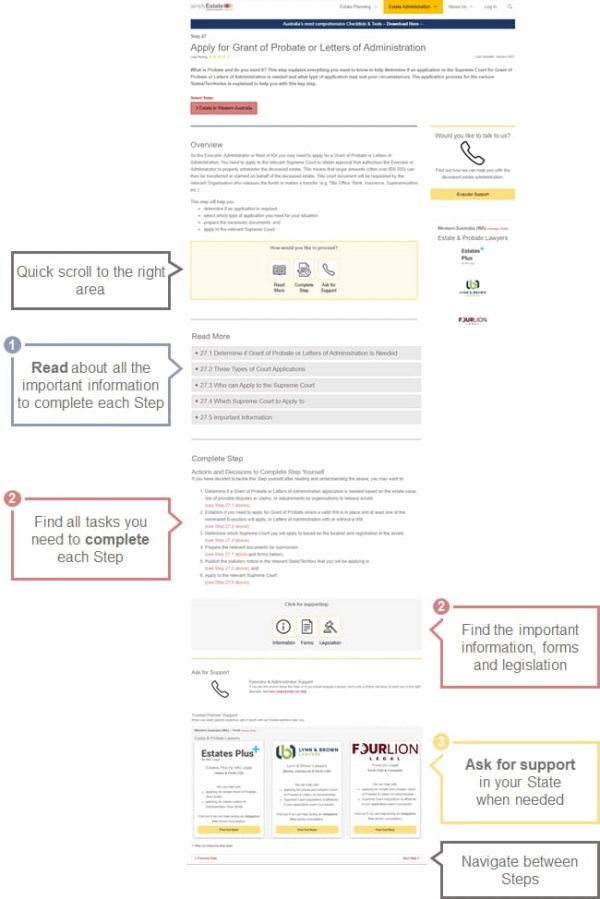Deceased Estate Administration Guide Instructions
Administration Guide

Structure
As you work through each Administration Guide Step, you can navigate using the arrows at the bottom of each page.
Each page is structured in the same way with the following information:
- Why completing the step is important;
- State selection;
- Overview of the Administration Step;
- Quick scroll to find the right place on the page;
- Information to read about the particular Step;
- Possible variations depending on your circumstance or State/Territory;
- Actions and decisions needed to complete the Step;
- Relevant information such as time and cost, forms, legislation and rules for the Step;
- Trusted Partners’ details if you would like support.
Glossary
All capitalised words on this website are either names or are terms defined in the Glossary.
Links to Documents
![]() links to PDF documents look like this
links to PDF documents look like this
![]() links to Word documents look like this
links to Word documents look like this
![]() links to Excel documents look like this
links to Excel documents look like this
![]() links to Legislation & Rules look like this
links to Legislation & Rules look like this
You will need Adobe PDF Reader, Microsoft Office Word and Microsoft Office Excel installed on your computer to view and complete forms, documents, checklists and tools available on this website.
Things to Keep in Mind
- Keep all receipts for deceased estate administration as you may be able to pay these from the deceased estate or claim back at a later stage;
- Try to follow the sequence and steps as provided on this website as it was designed to save time;
- Take your time and do not rush decisions if uncertain;
- Do not give in to pressure by Beneficiaries requesting for early inheritance payments by taking shortcuts or skipping important steps; remember that you as the Executor or Administrator are in charge of the process;
- Remember to seek support from family and friends;
- Remember that Powers of Attorney, Guardianships and authorised signatories that may have been in place to act on behalf of the deceased person end on the date of death and only the Executor, Administrator, Next of Kin or Legal Representative can administer the deceased estate;
- Work through the estate administration as soon as possible as some steps need to be completed within certain timeframes to avoid issues and negative financial impacts;
- Check the Will for any statements about financial compensation for your services and clarify this with Beneficiaries;
- If you lodge documents, always check if you should provide original or certified copies of important documents as the originals may not be returned to you;
- If you lodge documents via post, it is generally recommended to post these via registered post to have a record;
- it is recommended to always make a photocopy of all forms and documents lodged for your records; and
- Remember to seek relevant professional advice that is tailored to your circumstances if unsure or to confirm your understanding.
WARNING:
You should always ensure that the deceased person’s estate is protected from fraudulent or malicious activities. Ensure that you only deal with official Government Departments, Companies and Organisations that you can trust and are identifiable. Do not provide sensitive information about yourself or the deceased person unless you are certain that the information is protected and is only used for the intended purposes.
Responsibilities
It is important to understand that as the Executor of a Will or Administrator administering a deceased estate, you have certain responsibilities and fiduciary duties. This means that you will always act in the best interest of the deceased estate and not engage in a situation that results in a conflict of interest, meaning an action that would benefit you directly or indirectly as a result of the powers of those roles.
You will always act to the best of your ability and knowledge. Make sure to inform yourself as much as possible, think matters through sufficiently and let good judgment prevail at all times. Think of it as your duty to protect the estate on behalf of the deceased person. You should not be persuaded or talked into making decisions that you believe are not right.
Remember to always seek relevant professional advice specific to your circumstances when in doubt or to seek clarification.
Also, remember to check and discuss your understanding with the government departments, courts, companies or other organisations that you need to deal with during the estate administration process. Explain your specific situation and negotiate the best possible outcome for the estate.
Disclaimer
The Content and Services provided by simplyEstate may not be comprehensive and are for general information purposes only. It does not take into account your specific needs, objectives or circumstances, and it is not advice including (without limitation) legal advice, financial advice, accounting advice, tax advice or medical advice.
By using our website and making use of our services, you agree to our Terms & Conditions and Privacy Policy. If you do not agree with any of these you must immediately stop using this website.